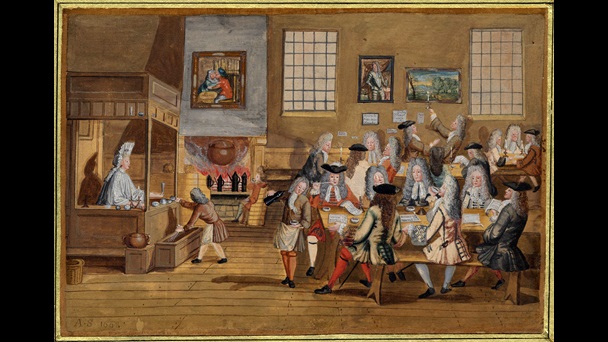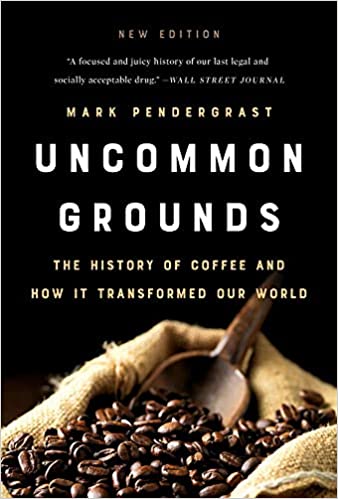The third wave of coffee is the change in culture that we have experienced in the last 20 years, where there is a desire of education and equality across the entire coffee industry. Our focus has shifted beyond the accessibility and convenience and more into the quality and value of the coffee we drink at home and away. If you didn't realise there were first and second waves, we'll give you a brief history of the waves of coffee.
History of Coffee
Coffee was thought to come to England in the mid 17th century, brought back by travellers that had learned about coffee consumption from their visits to Asia, and with very little caffeine found naturally in the diets of European people so observation of a mysterious dark liquid that seemed to have the opposite effect of fermented grapes and hops in stimulating the recipient was looked upon with great curiosity for the travellers.

A London Coffee House - image courtesy of British Library
Sir Francis Bacon was said to have researched the medicinal properties of coffee which lead to supposed cures for head-melancholy, gout, scurvy and excessive drunkedness, but this view shifted away from the medicinal properties and into the more novel enterprise of coffee houses, the first being in Oxford, where a patron would pay a penny for entry a cup of coffee and access to the newspapers and conversation with like minded individuals. From there the first London coffee house was created in 1652 and a steady rise saw more coffee houses in London by the 17th century than any other city in the world except for Constantinople.
The First Wave Of Coffee
By the turn of the 20th century, innovations came around that helped turn an exotic luxury into the commodity we have today. Freeze drying and vacuum sealing gave took away the barriers so people could enjoy coffee by simply adding hot water adding a level of convenience that the industrial revolution was already providing for many other commodities. It took it out of the socially exclusive coffee houses of the well educated and rich and became a staple of modern every day life. The focus of coffee had evolved into providing a caffeine kick
Second Wave Of Coffee
Coffee culture was about to change entirely in the 1970's when Starbucks spotted the market was after a more social experience, and consumers were starting to become aware of the quality and taste differences between different coffees.

They revolutionised café culture, stealing leisure time from pubs and bars. Consumers that were busy building the new service industries enjoyed the convenience and experience of visiting a coffee shop welcoming architecture and lighting.
The emphasis was not at this point on the taste of the coffee and very little notice was given to the origin of coffee instead masking the uninteresting and bitter dark coffee with flavourings from syrups and introducing a variety of coffee drinks like the Frappuccino in the 90's that boosted the popularity of coffee drinks to an even younger generation.
George Howell's shop created the Frappucino before they were bought out by Starbucks and was the gateway to coffee to many young people growing up with a Starbucks in their area.
Third Wave Coffee
Following a more critical approach to the way we drink our coffee, the 2000's saw coffee drinkers become more aware, knowledgeable and most importantly, interested in the journey of the coffee bean. Awareness of global exploitation and a desire for transparency transformed the industry as more consumers wanted to know what was going on behind the scenes as they decide where to spend their money.
The third wave of coffee is a movement that emphasises the high quality of beans, understanding how to bring out distinctive flavours from the bean through lighter roasts, sourcing fresh beans from single origin farms and then roasting them fresh.
We can appreciate a quality product, that has been grown and sourced in a sustainable and practical way. Many of the UK's best roasters will have relationships with the specific farms they source their beans from and be able to see directly the support they are providing the local economy, and that it is grown with the local environment. Specialty coffee takes greater ownership of the entire process, carefully considered, from the farms, to the beans, to roasting to preparation and enjoyment.
The third wave of coffee has breathed fresh air into the industry and through popularisation by coffee celebrities such as James Hoffman, more and more people are starting to become aware.
More information
If you want to immerse yourself in the history of coffee the staple book to read is Uncommon Grounds by Mark Pendergrast. It transfixes the coffee world on broader historical themes such as globalisation, slavery and marketing. It's well written and whilst focusses more on the waves of coffee in America, does a great job of telling the whole story;
Uncommon Grounds: The History of Coffee and How It Transformed Our World - Mark Pendergrast

